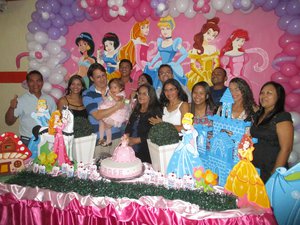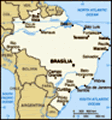Advertisement
Published: October 1st 2014

 Family!
Family!
Dan and Geli's extended family.Some final thoughts on our travels in Brasil (as it is spelled there).
Of course, just over three weeks is not enough time to really know any place, let alone the fifth most populated nation in the world. But we came to know some parts of it, and those fascinated me.
First, there are the people. The Brazilians we met work hard at making a life, not a ‘living.’ It seemed to me that family was the most important thing to many Brazilians; though stories of men leaving their families were all too common. But the folks we met thrived in extended families that lived together or nearby, and often included the most shirttail of relatives and good friends. When families expand, so does the house in order to include a new son- or daughter-in-law, grandchild, or grown child not yet on his/her own. And weekends and holidays were mainly an excuse for grand family gatherings.
I should add that Brazil is a nation of multi-colors and ethnic backgrounds that seem to go together well. I was told that there is some discrimination based on skin color; but we saw more families

 Marcia explaining her request.
Marcia explaining her request.
It is all in the pronunciation.and colors of differing skin tones, shapes and backgrounds than I have ever seen in the states or Europe.
Another note here—our friend Dan is American and a very white guy and his wife Geli is Brazilian, with all of the beautiful skin tone that brings to mind. They have a beautiful daughter, Rose, and Geli told us that “when she was born she was very white, but she is getting better.”
Second, there was the language. It is the era of ‘google translations’ and that led to plenty of rather odd sayings. A few of our favorites came from hotels were we were encouraged not to have out towels washed everyday in order to ‘help save the fountain head.’ We were seldom asked if we had any questions, rather if we ‘had any doubts’.
A story that will go down in family lore included Marcia asking repeatedly for the “sanitorio”, which was often how bathrooms were labeled. When we found out that her pronunciation had her asking for directions to the sanitarium we realized why her question was bringing so many stunned looks. (Luckily, no one took her up on

 Trains on time
Trains on time
Public art in the Sao Paulo train station.it; I would have had a hard time explaining why I left her in a Brazilian mental hospital.)
Third, the contradiction of the natural environment hit me in the face daily. Brazil is a beautiful country, yet so many people treat it like their private trash dump. I watched adults and children simply throw trash on the ground within walking distance of a public wastebasket—though it is true they were few and far between in some locations. The rivers in Sao Paulo looked and smelled like open sewers, as did the water running down the curbs in Santarem. In Rio, as beautiful as it was, buildings and natural wonders are often covered with graffiti and there seems to be no plan to clean it up.
Certainly the government bears a lot of responsibility for this, including the rivers and the massive destruction of the rain forests in order to grow soybeans to ship to China. But individually the people seem to care little for the environment as well.
Some of this makes me also marvel at how Brazil is a developed and emerging country all at the same time. Their wireless

 Fishing the Amazon
Fishing the Amazon
Two skilled young fishermen with their catch...much of it swimming in the boat.networks in many places far outstrip what we find in the U.S. and the operations in restaurants and stores with wireless ordering and electronic bills are amazing. At the same time, in every hotel, restaurant and all but one home that we were in, you put your toilet paper in the wastebasket and not the toilet because the pipes cannot handle the tissue. And in Sao Paulo you can ride the most advanced and modern metro system in the world. It is a land of contradictions.
Fourth, the sheer size of Brazil is overwhelming—and very unappreciated by Americans. It is the fifth largest nation in the world both in population and land mass—and its economy is the 7
th largest. (During the second Bush administration the nation was ignored, including snubbing the President of Brazil when she came to the states. This has led Brazil to become very good trading partners with Russia and China; no wonder the current U.S. embargo on Russia in response to the invasion of Crimea is having little effect—Brazil is picking up all the slack in exports of iron ore, food, gas and oil.)
Forget everything you learned in school

 New Friends Everywhere
New Friends Everywhere
You make friends at every corner in Brazil.about Brazil—especially the Amazon River and region. Think about the vision you have of the Amazon in your head—river not much bigger than the Missouri, with jungle overhead and monkeys and snakes. Hey folks, this river is over 25 miles across in places and looking at it I often thought I was looking out on a great lake. At the mouth of the Amazon there is an island, an island bigger than Switzerland! When you fly over Sao Paulo, a city of 22 million, it takes nearly 20 minutes. And when you fly from city to city you look down on mile after mile of jungle.
Finally, one more time it is necessary to say that the best thing about Brazil is its people. Work is hard, and taken on without complaint. I watched as workers made adaptations to a lack of modern construction equipment by hauling cement to work sites on their shoulders; similarly fishermen loaded their catch on large baskets perched on their heads to take to market. Very few loafers here and often, to make ends meet, people had two, three, even four jobs.
Everyone we asked for directions or information

 Even more friends
Even more friends
An English class at Vila Vehla who gladly welcomed us.went out of their way to help, often forgetting that we clearly did not speak Portuguese and giving detailed directions of which we understood little if any. They wanted to talk to us, practice their English, and most of all find out if we loved their country as they did. No one stood off or refused to communicate because we did not know their language, instead they wanted to help us have a good time and enjoy their home.
It was all summed up for me the day we visited Alter do Choa with our friends and their extended family. There must have been 20 or 25 family members, sharing a long table on the beach, ordering food, not worrying about figuring out the bill, and sharing ice-cold beer with anyone whose glass was empty. They dragged me along to a ride in the lagoon, and floated in the water with me talking politics. As I floated there I looked back to the shore and there was Marcia, sitting with the matriarch of the family. At 70 she had broken a wrist and had it reset, and she was explaining this all to Marcia, in Portuguese of
course. She knew that Marcia did not understand, and Marcia knew she did not know any English. But they looked like two old friends, sharing the shade on the beach, talking about life and their families as if that was all that mattered.
The people make the place, and the people of Brazil make this a country that, as confusing and at times maddening as it is, you can fall in love with.
Advertisement
Tot: 0.231s; Tpl: 0.012s; cc: 16; qc: 70; dbt: 0.0719s; 1; m:domysql w:travelblog (10.17.0.13); sld: 1;
; mem: 1.2mb







